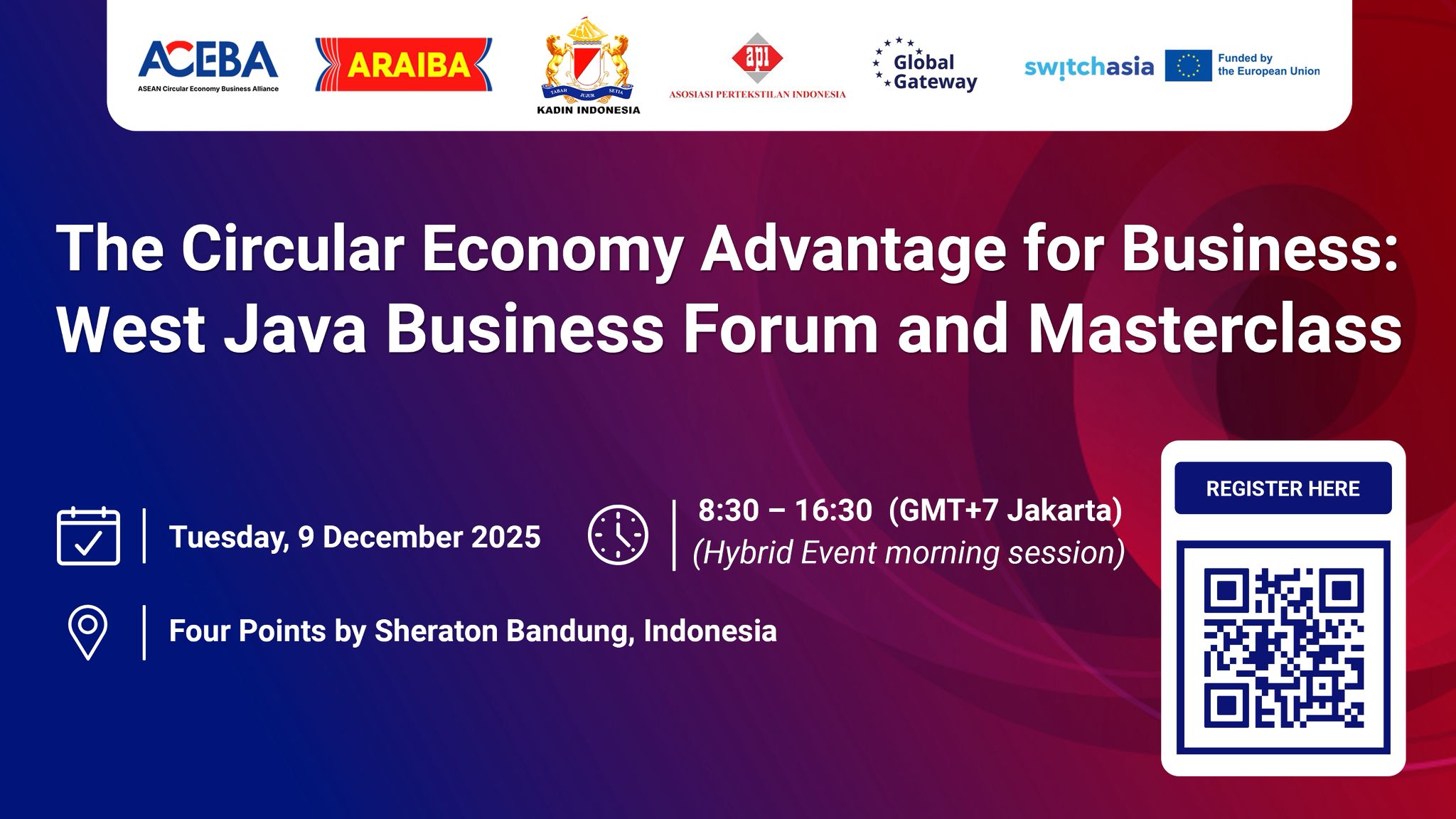The Circular Economy Advantage for Business: West Java Business Forum and Masterclass

Background
Southeast Asia has committed to transition to Circular Economy (CE) to support a resilient economy, sustainable growth, and resource efficiency, through the regional 2021 ASEAN Circular Economy Framework and related national policy, roadmaps, and action plans in Indonesia and six other ASEAN Member States. Leading businesses and other organizations in the region have started to benefit from the implementation of Circular Economy practices in sectors as diverse as agri-food, textile and garments, tourism and hospitality, building and construction, and waste minimization and recovery.
The ASEAN Circular Economy Business Alliance (ACEBA) has been launched in 2024 to further facilitate business leadership and action on CE, to contribute to the aims and objectives of the 2021 ASEAN Circular Economy Framework regionally and to support Indonesia to implement the Indonesia Circular Economy Roadmap and Action Plan 2025-2045. ACEBA engages businesses through advocacy, knowledge and experience sharing, provision of actionable tools and insights and networking.
Recognizing the profound contribution of business and industry in (West) Java to Indonesia’s development progress, ACEBA is organising the Circular Economy Advantage for Business: West Java Business Forum & Masterclass in Four Points by Sheraton Bandung, Indonesia on 9 December 2025 (08:30-16:30 (GMT+7) hybrid. This will be a business forum, aimed to showcase Indonesian and international circularity practices, and discuss opportunities for their scaling up, and a master class, aimed at delving deeper into CE product strategies and business models and practical ways for business to start their circularity journey.
Circular Economy: A Responsible Business and Innovation Opportunity
Circular economy takes a system’s perspective on the use and disposal of materials and other natural resources in the economy and society, to bring both the net inflows and net outflows of natural resources as close as possible to zero. For business, this involves taking responsibility to minimize the impacts on the environment of the use and disposal of materials, energy, water, and possibly other natural resources, in its products, services, and business operations, taking a life cycle perspective. This requires innovation in products, services and processes, towards circular value chains, that use materials and other natural resources in closed loops, efficiently and extendedly, whilst also capturing the benefits of renewable materials and energy.
Beyond the necessity to tackle the interrelated climate, nature and pollution crises, the circular economy provides a solid platform for businesses to perform well - through cost savings, new business opportunities, and improved resilience and preparedness – and do good – for the planet and people. The practical business value of Circular Economy is evident from select business cases in Indonesia and elsewhere in the region.
Fostering Business Leadership and Action on Circular Economy
Circular Economy continues to have different interpretations among businesses, policy makers and other stakeholders, impeding concerted efforts towards its overarching ambition for sustainable extraction, use and disposal of materials and other natural resources. To counter this challenge and galvanize business leadership, ACEBA with extensive input from businesses and other stakeholders around ASEAN, developed a Framework for Business Action on Circular Economy in Southeast Asia.
The Framework provides five guiding principles for business and other organisations to drive an impactful Circular Economy transformation, in short:
- PURPOSE: advancing net zero for climate, nature, and environment;
- SCOPE: implementing resource circularity, resource efficiency, and resource substitution;
- RATIONALE: assuming responsibility for the organization’s impacts on the environment and society;
- MEANS: ideating and co-creating circular solutions; and
- DEVELOPMENT CONTRIBUTION: creating net benefits for society and the economy.
These guiding principles articulate a magnetic north for businesses for consideration and adoption of Circular Economy.
Circular Economy Business Forum
The business forum zooms in on the question of ‘why CE matters for business?’. It will reflect upon the changing business and policy landscapes driving the CE transformation and the opportunities and challenges for business and industry to contribute. Doing so, it positions CE as a responsible business and innovation opportunity, a position that will be illustrated with business practices from Indonesia and elsewhere particularly Southeast Asia.
Target groups: The forum targets business executives, policy makers and industry, technology and environment professionals and will feature discussions on effective replication and scaling up, to enable Indonesian businesses to benefit from global transition to a circular, resource-efficient and low carbon economy.
Circular Economy Master Class
The master class aims to provide a high-level introduction and overview of practical ways for CE adoption in business, i.e. ‘how can business implement CE concepts and practices?’ The session will cover and practice the application of key CE concepts, product strategies and business models. It will also suggest and discuss ACEBA’s action menu based on stock take, ambition, delivery and integration (SADI) for enterprise level implementation. The master class targets industry professionals across different domains – operations, product development, procurement, sustainability, etc. – to equip them to initiate CE activities in their respective businesses.
Provisional Agendas: Business Forum: The Circular Economy Advantage for Business
|
Time |
Topic |
Lead |
|
08:20 – 09:00 |
Registration with coffee |
|
|
OPENING SESSION |
||
|
09:00 – 09:10 |
Welcome, safety briefing, introductions and overview of agenda |
|
|
09:10 – 09:40 |
Opening remarks and introduction of ACEBA |
Mr. Thomas THOMAS, co-convenor (ACEBA), chair (ARAIBA) and regional expert (SWITCH Asia PSC) |
|
Opening remarks by EU Delegation |
Ms. Novita SARI, Programme Manager, EU Delegation to Indonesia |
|
|
Opening remarks by API |
Mr. Jemmy KARTIWA, Chairman of the Indonesian Textile Association (API) |
|
|
Opening remarks by KADIN |
Ms. Masrura RAM IDJAL, PhD, Deputy Chair, West Java Regional Chapter of KADIN (Indonesian Chamber of Trade & Industry) |
|
|
Opening remarks by the Ministry of Industry |
Mr. Rizky Aditya WIJAYA, Director of Textile, Leather and Footwear, Ministry of Industry |
|
|
Session 1: Circular Economy: policy and business landscape |
||
|
09:40 – 09:50 |
Circular Economy – policy and business drivers ● Overview of key developments – global, regional and national |
Dr. Rene VAN BERKEL, co-convenor (ACEBA), CE expert (SWITCH Asia PSC) and international faculty (Thammasat University) |
|
09:50 – 10:20 |
Panel discussion – Reflections on CE drivers for Indonesian business Panellists ● Mr. Muhammad WIDODO, PhD, Associate Professor of Textile Chemistry, STTT (Institute of Technical Textile) Bandung. ● Ms. Aryenda ATMA, CEO/Founder of Pable ● Mr. Amit BAID, Head of Business Development, Asia Pacific Rayon (APR) ● Mr. Thomas THOMAS, co-convenor (ACEBA), chair (ARAIBA) and regional expert (SWITCH Asia PSC) |
Moderated by Mr. Basrie KAMBA, Chair (RTL) and CE national expert (SWITCH Asia PSC) |
|
10:20 – 10:40 |
Coffee break |
|
|
Session 2: Circular Economy: a responsible business and innovation opportunity |
||
|
10:40 – 10:55 |
Circular Economy in business practice ● Introduction of framework for CE business action ● Circular economy business cases – Indonesia and regional ● Resources for business |
Presented by Dr. Rene VAN BERKEL |
|
10:55 – 11:00 |
Video – circular economy for business in Southeast Asia |
|
|
11:00 – 11:50 |
Business Experiences Sharing ● Mr. Muhammad Agung SAPUTRA, Founder and CEO of Surplus Indonesia ● Ms. Aliya SARASTITA, CEO, The New Factory ● Mr. Ian SYARIF, Vice Chair of API and Director Sipata Moda Indonesia. ● Ms. Annisa Wibi, Co-Founder, and Chief Operating Officer, Mycotech Lab (MYCL) |
Moderated by Mr. Thomas THOMAS |
|
11:50 – 12:15 |
ACEBA – acting together towards ambitious circularity impact |
Moderated by Mr. Basrie KAMBA |
|
12:15 – 12:25 |
Closing remarks ● On behalf of ACEBA and co-organizers |
|
|
12:25 – 12:30 |
Vote of thanks |
Dr. Zinaida Fadeeva, Team Leader, SWITCH-Asia Policy Support Component (PSC) |
|
12:30 |
Networking Lunch |
|
Master Class: The Circular Economy Advantage for Business
|
Time |
Topic |
Sub-topics |
|
13:30 – 13:35 |
Introductions and overview |
|
|
13:35 – 15:15 |
Circular Economy Solutions |
● CE concepts and business practices ● CE product strategies & business models ● Circular Solution canvas |
|
15:15 – 15:30 |
Coffee break |
|
|
15:30 – 16:25 |
Circular Economy: guidance for implementation in business |
● ACEBA action menu – Stocktake, Ambition, Delivery & Integration ● Suggested methods and tools |
|
16:25 – 16:30 |
Participant’s reflections and closing remarks |
|
Share:
